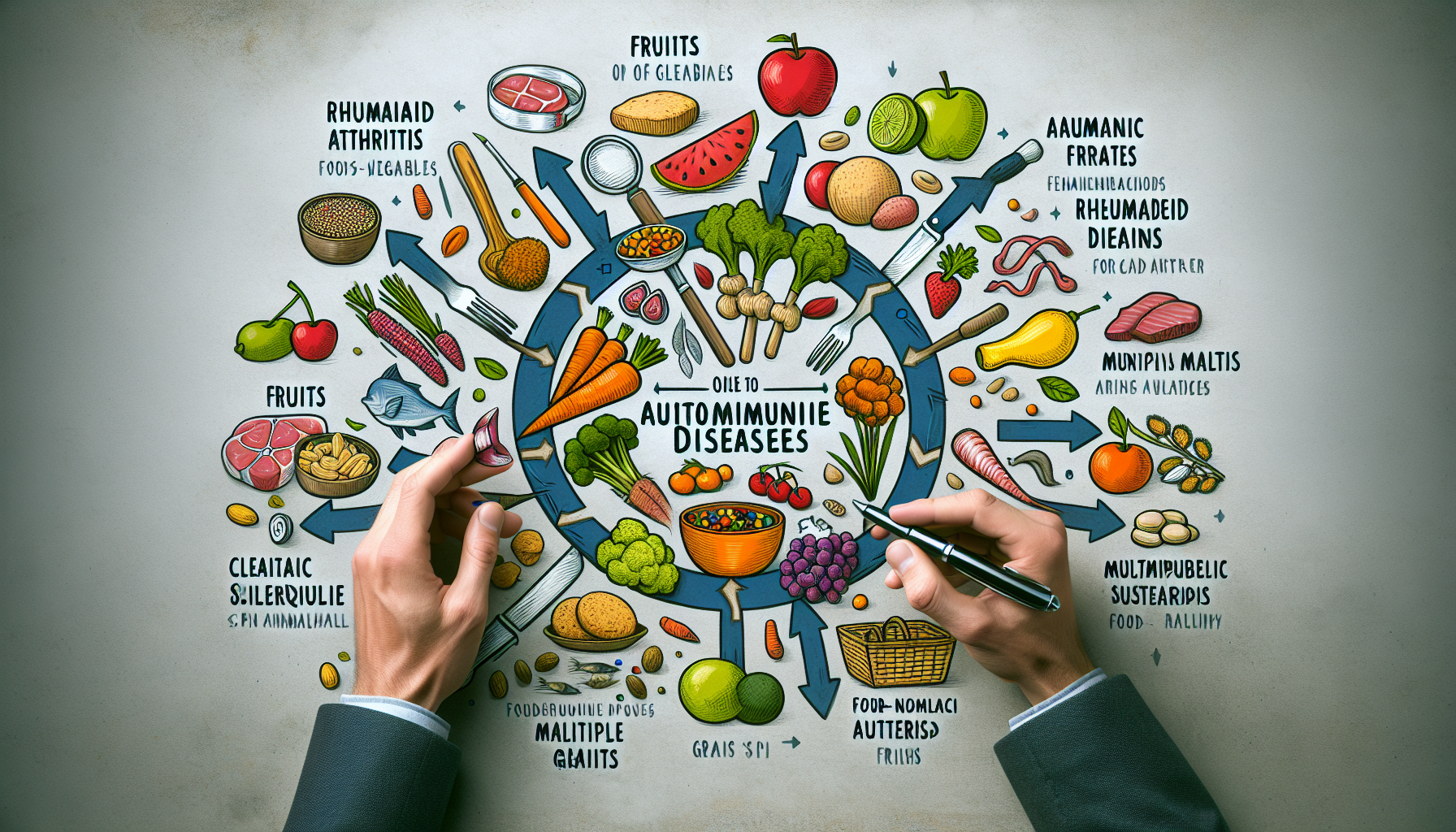You’re in for an eye-opening journey as we uncover the fascinating connection between nutrition and autoimmune diseases. Recent scientific studies have shed light on this complex link, offering valuable insights into how our dietary choices can impact the onset and progression of autoimmune conditions. For instance, a study published in the Journal of Clinical Investigation found that a specific type of fatty acid, known as omega-3, plays a crucial role in modulating immune responses and may protect against autoimmune diseases. Additionally, a research article in the journal Nutrients revealed that certain types of probiotics can help regulate the immune system and potentially alleviate symptoms of autoimmune disorders. With such intriguing findings to explore, let’s delve into the intricate relationship between nutrition and autoimmune diseases.
Discover the Ultimate Weight Loss Secrets Here!
Overview of Autoimmune Diseases
Autoimmune diseases are a group of disorders that arise when the body’s immune system mistakenly attacks healthy cells and tissues. Instead of recognizing and defending against outside invaders like bacteria and viruses, the immune system targets its own cells, causing chronic inflammation and damage to various organs and tissues. There are more than 100 known autoimmune diseases, including rheumatoid arthritis, multiple sclerosis, lupus, and Crohn’s disease, among others. These conditions can significantly impact a person’s quality of life and may lead to long-term complications if left untreated.
Definition of Autoimmune Diseases
Autoimmune diseases are characterized by a malfunctioning immune system, which mistakenly identifies normal body tissues as foreign and launches an immune response against them. Normally, the immune system’s role is to protect the body from harmful substances and foreign invaders. However, in the case of autoimmune diseases, the immune system fails to distinguish between healthy cells and pathogens, leading to a chronic inflammatory response that damages tissues and organs. This immune dysfunction can occur throughout the body, affecting various systems and causing a range of symptoms.
Prevalence of Autoimmune Diseases
Autoimmune diseases collectively have a significant impact on public health. They are estimated to affect up to 8% of the global population, with women being more prone to developing these conditions compared to men. The prevalence of autoimmune diseases varies depending on the specific condition, geographical location, and genetic factors. Some autoimmune diseases, such as type 1 diabetes and multiple sclerosis, have shown an increase in incidence over the years. Researchers continue to explore the reasons behind this rise and search for ways to effectively manage and treat these conditions.
Causes of Autoimmune Diseases
The exact causes of autoimmune diseases are still not fully understood. However, a combination of genetic, environmental, and hormonal factors are believed to play a role in their development. Studies have shown that individuals with a family history of autoimmune diseases are at higher risk of developing these conditions themselves. Additionally, certain environmental triggers, such as infections, exposure to certain chemicals, and dietary factors, may initiate or exacerbate the autoimmune response in susceptible individuals. Hormonal imbalances, especially in women, have also been associated with an increased risk of developing autoimmune diseases.
The Role of Nutrition in Autoimmune Diseases
Nutrition plays a crucial role in the management and prevention of autoimmune diseases. While diet alone cannot cure these conditions, it can significantly influence disease activity, symptom severity, and overall well-being. Recent studies have highlighted several aspects of nutrition that are particularly relevant in autoimmune diseases, including the impact of diet on disease progression, the influence of gut health on immune function, and the association between nutritional deficiencies and autoimmune conditions.

Click Here for Proven Fat-Burning Strategies!
Impact of Diet on Autoimmune Diseases
Research suggests that certain dietary patterns can either contribute to or alleviate autoimmune disease symptoms. A Western diet, characterized by high intake of processed foods, refined sugars, unhealthy fats, and low in fruits and vegetables, has been linked to increased inflammation and a higher risk of developing autoimmune diseases. On the other hand, an anti-inflammatory diet, rich in whole foods, fruits, vegetables, healthy fats, and lean proteins, has shown promise in reducing inflammation markers and improving symptoms in individuals with autoimmune diseases.
Influence of Gut Health on Autoimmune Diseases
The gut is home to trillions of bacteria and other microorganisms that make up the gut microbiome. Emerging research suggests that the composition and diversity of the gut microbiome play a pivotal role in regulating immune function and may influence the development and progression of autoimmune diseases. Dysbiosis, an imbalance in the gut microbiota, has been observed in individuals with autoimmune diseases, leading to increased intestinal permeability (“leaky gut”) and triggering immune responses. Maintaining a healthy gut microbiome through proper nutrition and lifestyle choices may help modulate the immune system and reduce autoimmune inflammation.
Nutritional Deficiencies and Autoimmune Diseases
Nutritional deficiencies are common in individuals with autoimmune diseases and can worsen disease outcomes. For example, vitamin D deficiency has been associated with an increased risk of developing multiple sclerosis and rheumatoid arthritis. Omega-3 fatty acid deficiency has also been linked to higher disease activity in individuals with lupus and inflammatory bowel disease. Adequate intake of essential nutrients, such as vitamins, minerals, and antioxidants, is crucial for optimal immune function and may help manage autoimmune diseases.
Specific Nutrients and Autoimmune Diseases
Certain nutrients have shown potential in modulating autoimmune disease symptoms and disease progression. Vitamin D is a key player in regulating immune function and has been linked to a reduced risk of autoimmune diseases. Omega-3 fatty acids, found in fatty fish and certain plant sources like flaxseeds and walnuts, have anti-inflammatory properties and may ease symptoms in individuals with autoimmune diseases. Antioxidants, such as vitamins A, C, and E, help combat oxidative stress and minimize inflammation. Probiotics, beneficial bacteria found in fermented foods or supplements, can promote a healthy gut microbiome and support immune health. Additionally, some individuals may find relief from autoimmune symptoms by avoiding gluten and dairy products, as they can trigger immune responses in susceptible individuals.
The Gut Microbiome and Autoimmune Diseases
The gut microbiome refers to the community of microorganisms living in our digestive tract. It is increasingly recognized as a vital player in autoimmune diseases. Studies have revealed that alterations in the gut microbiome composition, referred to as dysbiosis, may contribute to the development and progression of autoimmune diseases. Dysbiosis can disrupt the delicate balance between immune tolerance and immune activation, potentially leading to chronic inflammation and tissue damage. Consequently, maintaining a healthy gut microbiome through diet, probiotics, and other lifestyle interventions may help manage autoimmune diseases.

Unlock Your Path to a Healthier You!
Understanding the Gut Microbiome
The gut microbiome is a complex ecosystem composed of bacteria, viruses, fungi, and other microorganisms. It begins to develop at birth and is influenced by factors such as mode of delivery, breastfeeding, early exposure to microorganisms, and diet. The gut microbiome plays a vital role in digestion, metabolism, immune function, and overall health. It interacts closely with the immune system, providing essential signals for optimal immune responses and maintaining a balanced immune state.
Microbiome Dysbiosis in Autoimmune Diseases
Numerous studies have documented alterations in the gut microbiome of individuals with autoimmune diseases compared to healthy individuals. These alterations often include reduced microbial diversity, overgrowth of certain bacteria, and changes in beneficial microbial metabolites. The specific microbial imbalances vary depending on the autoimmune condition, but common findings include decreased levels of bacteria with anti-inflammatory properties and an increase in pro-inflammatory bacteria. Understanding the role of dysbiosis in autoimmune diseases may provide insights into potential therapeutic strategies targeting the gut microbiome.
Leaky Gut Syndrome and Autoimmune Diseases
Leaky gut syndrome, also known as increased intestinal permeability, refers to a condition where the lining of the intestines becomes more permeable than normal. This increased permeability allows harmful substances, toxins, and undigested food particles to cross the intestinal barrier and enter the bloodstream, triggering immune responses and inflammation. Leaky gut syndrome has been implicated in various autoimmune diseases, as the translocation of these substances into the bloodstream can stimulate the immune system and contribute to the autoimmune response. Maintaining a healthy gut barrier through proper nutrition and lifestyle choices may help prevent or manage leaky gut and its potential contribution to autoimmune diseases.
Effects of Gut Microbiome on Immune System
The gut microbiome plays a fundamental role in shaping immune function and maintaining immune tolerance. The microorganisms residing in the gut interact closely with immune cells and help train the immune system to distinguish between harmless substances and potential pathogens. Dysbiosis disrupts this delicate interaction, compromising immune regulation and potentially promoting autoimmune responses. Understanding the intricate relationship between the gut microbiome and the immune system is critical for developing targeted interventions to modulate immune responses in autoimmune diseases.
Concept of Anti-Inflammatory Diet
An anti-inflammatory diet focuses on consuming foods that reduce inflammation in the body, which is a key component of autoimmune disease management. This dietary approach emphasizes whole foods, including fruits, vegetables, whole grains, lean proteins, and healthy fats, while limiting or avoiding processed foods, refined sugars, unhealthy fats, and artificial additives. By following an anti-inflammatory diet, individuals with autoimmune diseases may experience reduced inflammation, improved symptoms, and enhanced overall health.
Foods to Include
An anti-inflammatory diet encourages the consumption of foods rich in antioxidants, which help neutralize harmful free radicals and minimize inflammation. Some beneficial foods include colorful fruits and vegetables, fatty fish (such as salmon, mackerel, and sardines), nuts and seeds, olive oil, green tea, and spices like turmeric and ginger. These foods are known for their anti-inflammatory properties and can support immune function and overall well-being.
Foods to Avoid
To reduce inflammation and manage autoimmune diseases, it is advisable to limit or avoid certain foods that may trigger immune responses or worsen symptoms. Processed foods, sugary snacks, refined grains, red and processed meats, high-fat dairy products, and foods containing artificial additives and preservatives should be minimized in an anti-inflammatory diet. It is also important for individuals to identify and avoid specific allergens or food sensitivities that may exacerbate their autoimmune symptoms.
Effects on Inflammation and Disease Activity
Adopting an anti-inflammatory diet has been shown to have a positive impact on inflammation markers and disease activity in individuals with autoimmune diseases. Studies have found that this dietary approach can lead to a reduction in inflammatory markers, such as C-reactive protein, and improve symptoms in conditions like rheumatoid arthritis, lupus, and inflammatory bowel disease. While results may vary among individuals, incorporating an anti-inflammatory diet as part of an overall treatment plan can contribute to better disease management and improved quality of life.
The Role of Gluten and Dairy in Autoimmune Diseases
Gluten and dairy are two categories of food that have been closely linked to autoimmune diseases. For individuals with celiac disease or gluten sensitivity, consuming gluten can trigger an immune response that damages the small intestine. Some research suggests that individuals with autoimmune diseases, even without diagnosed gluten sensitivity, may experience symptom improvement by following a gluten-free diet. Similarly, dairy products have been associated with increased inflammation in some individuals with autoimmune diseases, potentially due to lactose intolerance or sensitivity to dairy proteins.
Celiac Disease and Gluten Sensitivity
Celiac disease is an autoimmune condition triggered by the ingestion of gluten, a protein found in wheat, barley, and rye. When individuals with celiac disease consume gluten, their immune system mounts an inflammatory response that damages the small intestine’s lining, leading to malabsorption of nutrients and various symptoms. Gluten sensitivity, on the other hand, refers to a non-celiac condition where individuals experience adverse symptoms after consuming gluten. While both conditions involve immune responses to gluten, celiac disease is an autoimmune condition, whereas gluten sensitivity is not.

Gluten-Related Disorders and Autoimmunity
In addition to celiac disease, gluten has been implicated in other autoimmune and inflammatory conditions. Recent studies suggest that gluten-related disorders, even in the absence of celiac disease, may trigger or exacerbate autoimmune responses in susceptible individuals. This phenomenon, often referred to as non-celiac gluten sensitivity, remains an area of ongoing research. Some individuals with autoimmune diseases may find relief from symptoms by eliminating gluten from their diet, but it is essential to work with a healthcare professional or registered dietitian to ensure nutritional adequacy.
Link between Dairy Consumption and Autoimmunity
Dairy products, such as milk, cheese, and yogurt, contain proteins like casein and whey, as well as lactose, a milk sugar. Some individuals with autoimmune diseases may experience adverse reactions to these components, leading to inflammation and worsening symptoms. Lactose intolerance, a common condition characterized by the inability to digest lactose, can also contribute to digestive issues and discomfort. It is important for individuals with autoimmune diseases to monitor their response to dairy products and consider alternatives if they find a correlation between consumption and symptom aggravation.
The Influence of Environmental Factors on Autoimmune Diseases
Apart from genetic and hormonal factors, environmental exposures have been implicated in the development and progression of autoimmune diseases. While research is ongoing and the mechanisms are not fully understood, several environmental factors have been associated with an increased risk of autoimmune diseases.
Chemical Exposures
Exposure to certain chemicals, such as solvents, pesticides, and heavy metals, has been linked to an increased risk of autoimmune diseases. Occupational exposure to chemicals, as well as environmental pollutants, may contribute to immune dysfunction and trigger autoimmune responses. Studies have revealed associations between specific chemical exposures and autoimmune diseases such as lupus, rheumatoid arthritis, and multiple sclerosis. Minimizing exposure to harmful chemicals and practicing safety measures in occupational and environmental settings may help reduce the risk of developing autoimmune diseases.
Heavy Metals
Heavy metals, including mercury, lead, and cadmium, are toxic substances that can accumulate in the body over time. Exposure to heavy metals through contaminated food, water, air, or occupational settings has been associated with an increased risk of autoimmune diseases. These metals can disrupt immune function, promote inflammation, and contribute to the development of autoimmune responses. Minimizing exposure to heavy metals by avoiding contaminated sources, consuming a balanced diet, and practicing proper occupational and environmental safety measures is crucial for individuals concerned about autoimmune diseases.

Air Pollution
Air pollution is a widespread environmental factor that has been linked to various health issues, including autoimmune diseases. Inhalation of air pollutants, such as particulate matter, nitrogen dioxide, and volatile organic compounds, has been associated with increased inflammation, oxidative stress, and altered immune responses. These effects may contribute to the development or exacerbation of autoimmune diseases. Living in polluted areas or exposure to high levels of air pollution may increase the risk of autoimmune diseases, making it important to advocate for clean air standards and limit exposure to polluted environments whenever possible.
Smoking and Autoimmune Diseases
Cigarette smoking has long been recognized as a detrimental habit with numerous health consequences, including an increased risk of autoimmune diseases. Smoking has been linked to an increased risk of developing autoimmune diseases such as rheumatoid arthritis, systemic lupus erythematosus, and multiple sclerosis. It is believed that smoking contributes to immune dysregulation and inflammation, potentially triggering or exacerbating autoimmune responses. Quitting smoking or avoiding exposure to secondhand smoke is crucial for reducing the risk of autoimmune diseases and promoting better overall health.
The Importance of a Balanced Diet in Autoimmune Diseases
Maintaining a balanced diet is essential for overall health, and it becomes even more crucial for individuals with autoimmune diseases. A balanced diet ensures an adequate intake of macronutrients (carbohydrates, proteins, and fats) and micronutrients (vitamins and minerals), which play vital roles in supporting immune function, reducing inflammation, and promoting overall well-being.
Macronutrients: Carbohydrates, Proteins, and Fats
Carbohydrates, proteins, and fats are the three main macronutrients required for proper bodily functions. Optimal intake of these macronutrients is important for individuals with autoimmune diseases. Carbohydrates provide the body with energy, while proteins aid in tissue repair and support immune function. Fats, particularly healthy unsaturated fats found in foods like avocados, nuts, and olive oil, are essential for absorbing fat-soluble vitamins and maintaining a healthy inflammatory response. Striking a balance between these macronutrients is crucial for individuals with autoimmune diseases, and consultation with a healthcare professional or registered dietitian can help determine individual requirements.
Micronutrients: Vitamins and Minerals
Micronutrients, such as vitamins and minerals, are vital for supporting immune function, reducing inflammation, and maintaining overall health. Some essential vitamins and minerals that have been implicated in autoimmune diseases include vitamin D, vitamin C, vitamin E, selenium, and zinc. These nutrients have various roles in immune regulation, antioxidant defense, and tissue repair. Ensuring an adequate intake of these micronutrients through a balanced diet or supplementation, when necessary, is important for individuals with autoimmune diseases. However, it is always advisable to consult with a healthcare professional or registered dietitian to determine appropriate supplementation based on individual needs.
Hydration and Autoimmune Diseases
Proper hydration is essential for overall health, and it becomes even more crucial for individuals with autoimmune diseases. Chronic inflammation and medications used to manage autoimmune diseases can potentially increase fluid requirements. Staying adequately hydrated helps maintain optimal digestion, nutrient absorption, and toxin elimination. It can also support immune function and reduce the risk of developing secondary health complications. Individuals with autoimmune diseases should strive to drink an adequate amount of water throughout the day and monitor their hydration status to ensure optimal well-being.
Effects of Weight Management on Autoimmune Diseases
Maintaining a healthy weight is important for individuals with autoimmune diseases, as excess weight can contribute to disease progression and worsen symptoms. Obesity, defined as having a body mass index (BMI) of 30 or above, is associated with an increased risk of developing autoimmune diseases and can exacerbate symptoms in individuals already diagnosed with an autoimmune condition.
Obesity and Autoimmunity
Obesity has been linked to an increased risk of developing autoimmune diseases. Adipose tissue, or body fat, releases pro-inflammatory molecules that can disrupt immune function and promote chronic inflammation. This dysregulated immune response can contribute to the development of autoimmune diseases. Maintaining a healthy weight through a balanced diet and regular physical activity is crucial for reducing the risk of autoimmune diseases and managing symptoms in individuals already diagnosed with an autoimmune condition.
Weight Loss and Disease Progression
Weight loss has shown promise in improving disease outcomes and reducing symptoms in individuals with autoimmune diseases. Studies have demonstrated that even modest weight loss can lead to a reduction in inflammation markers and improved disease activity in conditions such as rheumatoid arthritis and psoriasis. Weight loss achieved through a combination of a healthy diet and regular exercise can have positive effects on immune function, metabolic health, and overall well-being. It is important to work with a healthcare professional or registered dietitian to develop an individualized weight loss plan that prioritizes nutrient adequacy and sustainability.
Healthy Eating for Weight Management
Healthy eating is a key component of weight management in individuals with autoimmune diseases. Adopting a balanced diet that provides essential nutrients while promoting weight loss can be beneficial. This includes consuming a variety of nutrient-dense foods, such as fruits, vegetables, whole grains, lean proteins, and healthy fats, while limiting processed foods, sugary snacks, and unhealthy fats. Portion control, mindful eating, and regular physical activity are also important strategies for achieving and maintaining a healthy weight. Consulting with a healthcare professional or registered dietitian can provide personalized guidance and support in developing a healthy eating plan that suits individual needs and goals.
Personalized Nutrition Approaches for Autoimmune Diseases
Due to the individual variability in autoimmune diseases, personalized nutrition approaches can be beneficial in managing symptoms and promoting overall well-being. These approaches take into consideration an individual’s unique genetic makeup, medical history, symptoms, and dietary preferences to develop a tailored nutrition plan. Several strategies can be employed in personalized nutrition for autoimmune diseases, including bio-individuality, elimination diets, supplementation, and working with a registered dietitian.
Bio-individuality and Nutritional Needs
Bio-individuality recognizes that each person has unique nutritional requirements, sensitivities, and responses to different foods. In the context of autoimmune diseases, individuals may respond differently to specific dietary interventions based on their genetic predisposition, gut microbiome composition, and immune responses. Recognizing and addressing bio-individuality is key in developing personalized nutrition approaches that optimize symptom management and overall health.
Elimination Diets
Elimination diets involve temporarily removing specific foods or food groups from the diet to identify potential triggers for symptoms or inflammation. In the case of autoimmune diseases, elimination diets may target common allergens or irritants that are known to exacerbate symptoms, such as gluten, dairy, or certain nightshade vegetables. By systematically reintroducing eliminated foods and monitoring symptom responses, individuals can identify their unique dietary triggers and make informed decisions about their diet.
Supplementation
Supplementation may be necessary for individuals with autoimmune diseases to ensure optimal nutrient intake and support specific health needs. Nutritional deficiencies are common in autoimmune diseases, and supplementation can help address these deficiencies. However, it is crucial to work with a healthcare professional or registered dietitian to determine appropriate supplement choices, dosages, and potential drug-nutrient interactions.
Working with a Registered Dietitian
Collaborating with a registered dietitian who specializes in autoimmune diseases can provide valuable guidance and support in developing a personalized nutrition plan. Registered dietitians have the expertise to assess individual nutritional needs, provide evidence-based recommendations, and monitor progress. They can help individuals navigate dietary challenges, develop meal plans, and provide education and resources to empower individuals to make informed food choices.
In conclusion, nutrition plays a key role in the management and prevention of autoimmune diseases. A balanced diet that focuses on whole foods, supports gut health, and addresses individual needs can help reduce inflammation, alleviate symptoms, and improve overall well-being. Personalized nutrition approaches, such as elimination diets and working with registered dietitians, can help individuals optimize their nutrition and manage autoimmune diseases more effectively. By incorporating these principles into their lifestyle, individuals with autoimmune diseases can take an active role in their health and well-being.

